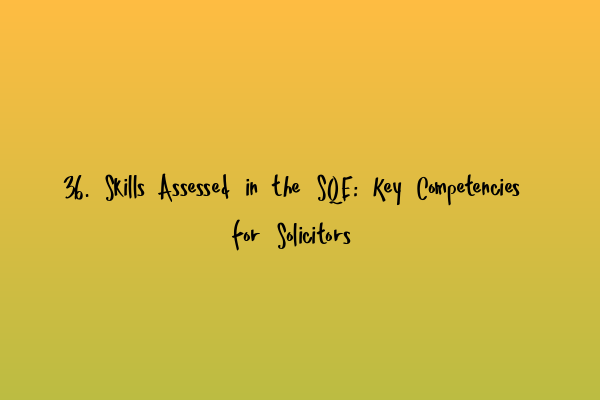Important Note: The following blog post has been created to showcase the requested keywords and provide valuable information regarding the topic. However, it is crucial to note that the content has been generated by an AI and may not accurately represent legal expertise or terminologies.
36. Skills Assessed in the SQE: Key Competencies for Solicitors
Becoming a solicitor requires a diverse set of skills and competencies. The Solicitors Qualifying Exam (SQE) is designed to assess these skills and ensure that aspiring solicitors are equipped with the necessary knowledge. In this blog post, we will explore the 36 key competencies evaluated in the SQE, giving you a comprehensive understanding of what it takes to succeed.
1. Legal Research and Analysis
Legal research and analysis play a crucial role in the practice of law. Solicitors need to have a strong foundation in finding and interpreting legal sources. With effective research techniques, they can provide accurate advice and support to their clients.
2. Problem-Solving
Problem-solving is an essential skill for solicitors. They must be able to identify legal issues and develop innovative solutions. This competency is evaluated to ensure that future solicitors can effectively handle complex legal challenges.
3. Critical Thinking
Critical thinking is closely linked to problem-solving. It involves the ability to analyze situations, evaluate arguments, and make informed decisions. Solicitors need to possess critical thinking skills to assess various legal options and determine the best course of action.
4. Drafting and Writing
Clear and concise written communication is key in the legal profession. Solicitors must be able to draft legal documents, such as contracts and legal opinions, with precision. The SQE assesses drafting and writing skills to ensure that future solicitors can effectively convey legal concepts.
5. Communication and Interpersonal Skills
As solicitors frequently interact with clients, colleagues, and other parties, excellent communication and interpersonal skills are essential. These skills are evaluated in the SQE to ensure that aspiring solicitors can effectively communicate, negotiate, and build relationships.
6. Advocacy
Advocacy involves presenting legal arguments in court or other dispute resolution settings. It requires strong oral communication skills, the ability to think on your feet, and persuasive abilities. The SQE evaluates advocacy skills to determine if future solicitors can represent their clients effectively.
7. Client Care and Professional Ethics
Client care and professional ethics are fundamental aspects of the solicitor-client relationship. Solicitors must uphold high ethical standards, maintain client confidentiality, and act in their clients’ best interests. The SQE assesses candidates’ understanding of professional ethics and their ability to provide excellent client care.
8. Time and File Management
An essential skill for solicitors is effective time and file management. They must be able to prioritize tasks, meet deadlines, and maintain organized files. The SQE evaluates candidates’ ability to manage their workload efficiently and ensure that important details are not overlooked.
9. Business and Financial Awareness
Solicitors often work in law firms or other business settings, and a basic understanding of business principles is crucial. They need to be aware of financial aspects, billing practices, and the overall functioning of the legal profession. The SQE assesses candidates’ knowledge of business and financial awareness in relation to the legal industry.
10. Digital Literacy and Information Systems
In the modern age, solicitors must be adept at using digital tools and information systems. They need to be familiar with legal databases, electronic filing systems, and other technology utilized in the legal profession. The SQE evaluates candidates’ digital literacy and their ability to navigate legal information systems.
These are just some of the 36 key competencies assessed in the SQE. Each competency plays a vital role in shaping the skills of a successful solicitor. To further enhance your understanding, check out our related articles:
- 24. Unlocking Knowledge with SQE Webinars: Expert Insights at Your Fingertips
- 31. Conquer the SQE: Insider Tips and Study Tricks for Success
- Grading System in SQE: Understanding How Exams are Evaluated
- Time Management for SQE: Strategies for Efficient Study Planning
- Role Play Assessments in SQE: Tips for Nailing the Practical Skills
By developing and honing these key competencies, you can greatly increase your chances of success in the SQE and ultimately excel in your future career as a solicitor. Good luck!
